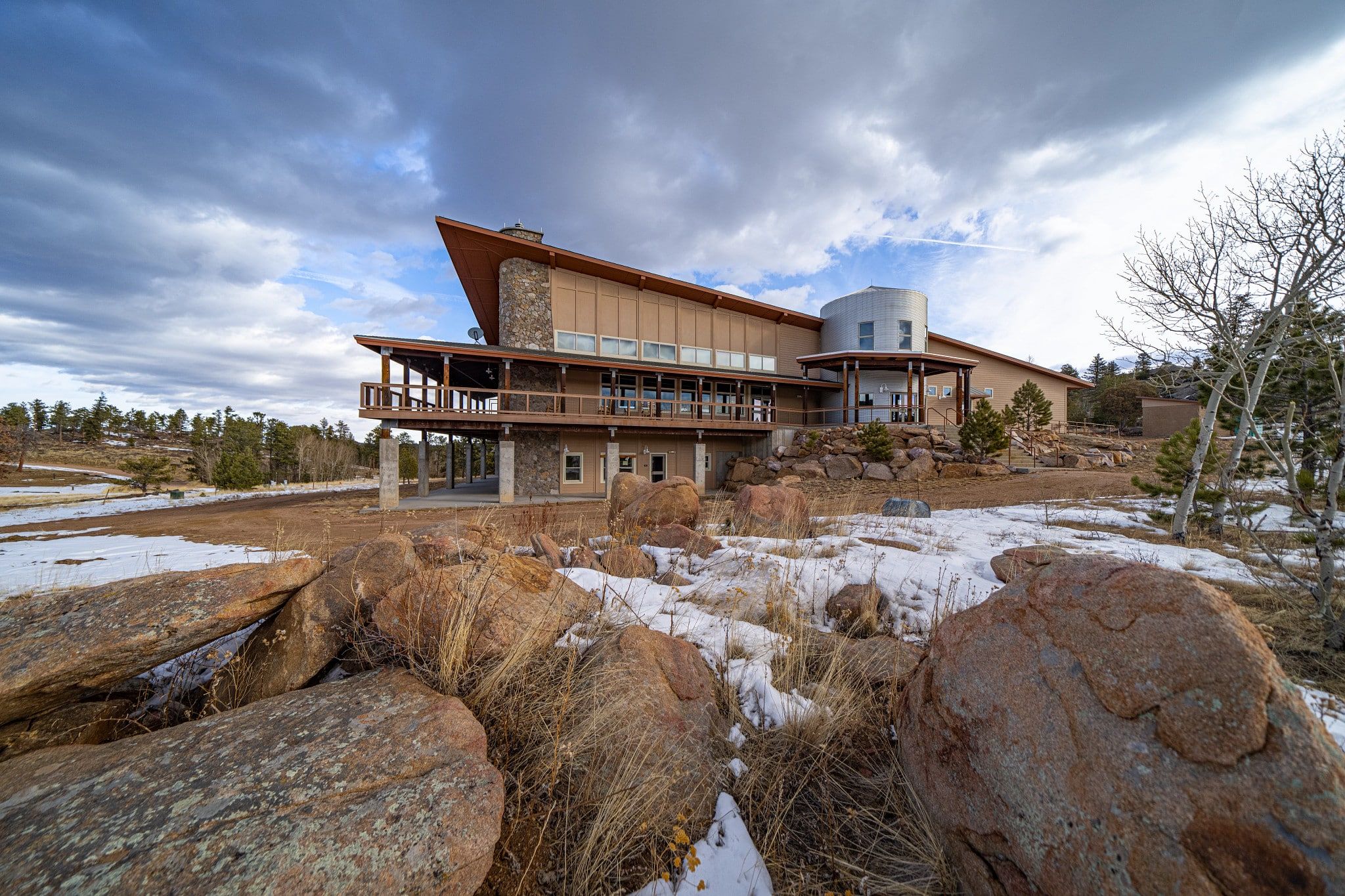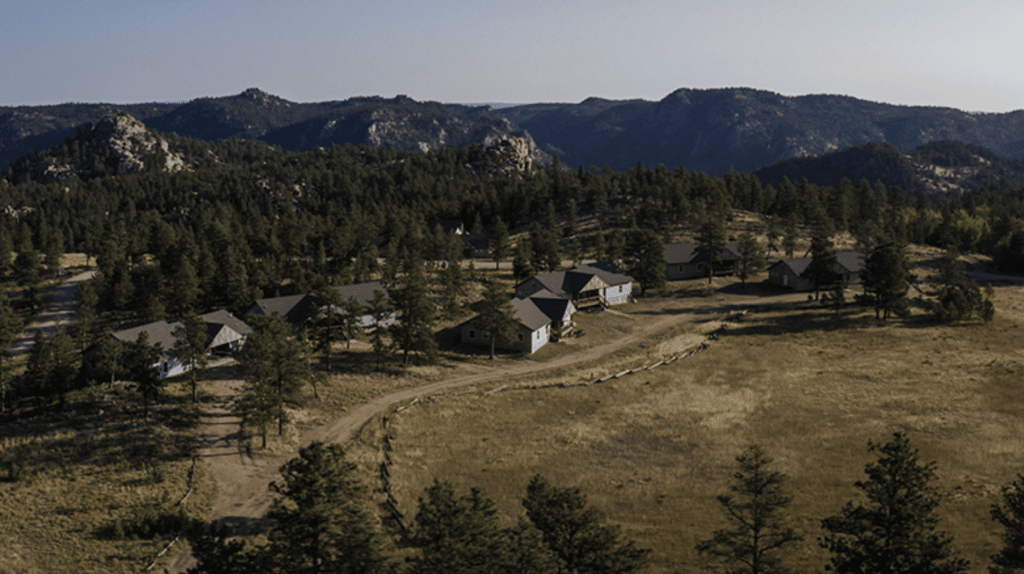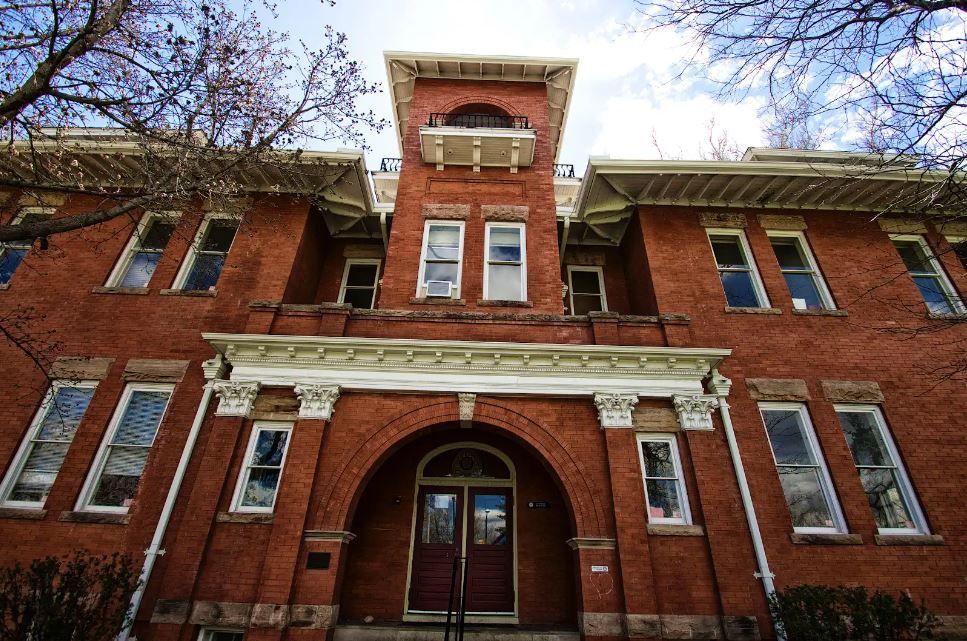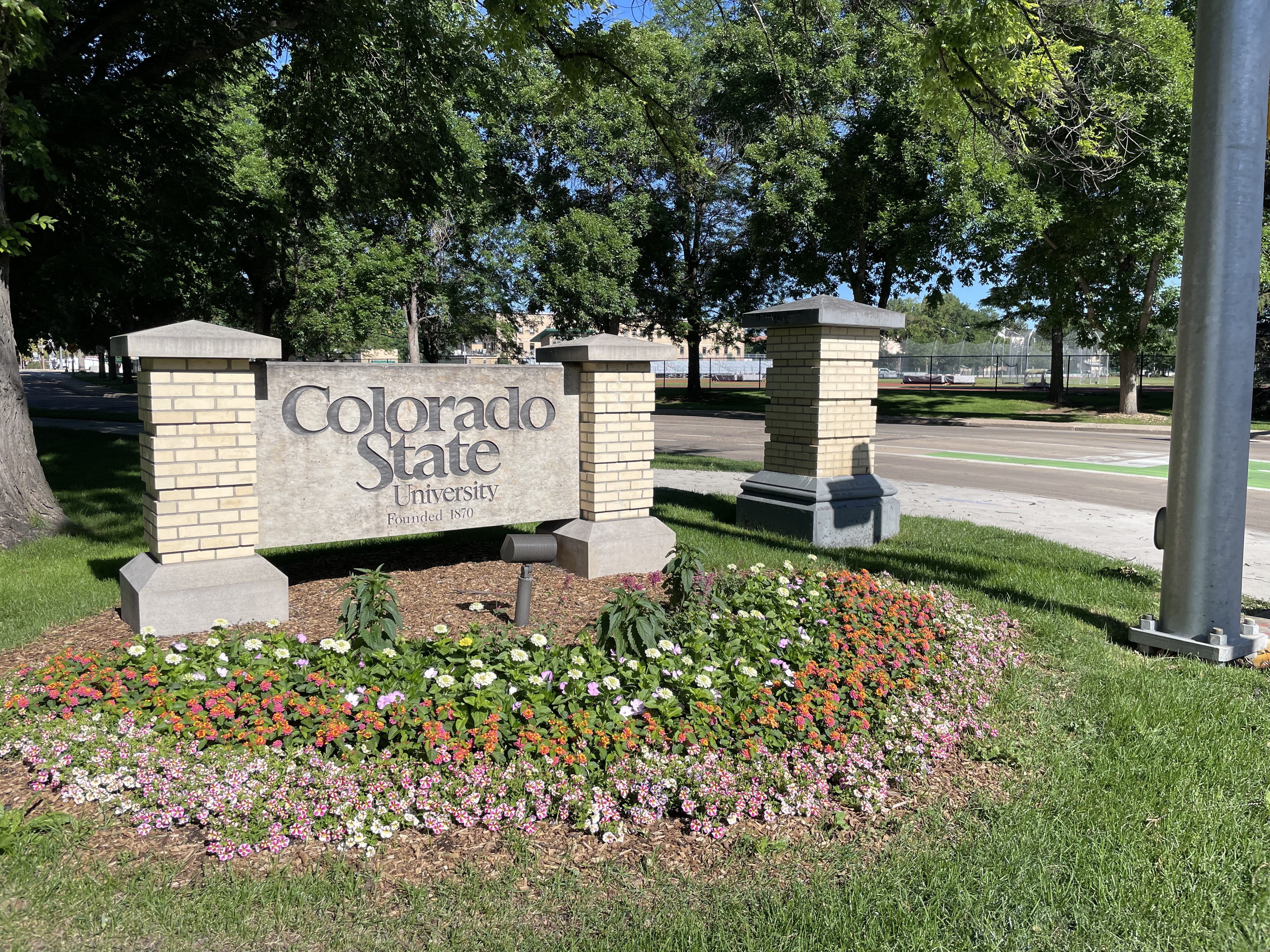DU’s new mountain campus takes higher education literally
University seeks to elevate college experience

RED FEATHER LAKES — They were told that college would be an adventure. What many of them didn’t count on was that their educational adventures wouldn’t just take place in an urban setting — but would be elevated in the scenic Rocky Mountain foothills of Larimer County as well.
The University of Denver on Sept 7 welcomed the Class of 2026: 1,640 first-year students from 1,168 different high schools. In the ceremony at Magness Arena on the Denver campus, Chancellor Jeremy Haefner affirmed DU’s commitment to its trademark “4-D Experience” — dimensions stressing academic growth, well-being, character and purpose — and highlighted how their visits to the new James C. Kennedy Mountain Campus, a former Girl Scout camp east of Red Feather Lakes that was acquired last October, would further those goals.
Throughout the fall quarter, the first cohorts of first-year students are traveling to the mountain campus for their “First Ascent,” an Outward Bound-inspired program that DU describes as “a weekend packed with a range of activities, from hiking, climbing and meditating to arts and crafts, s’mores around the campfire and a challenge course that promotes personal and group achievement. … And they will make the lifelong friendships that will help define their time at DU.”
SPONSORED CONTENT
Besides the freshman orientation programming, DU plans to use the campus the rest of the year for faculty-led research projects for students who are interested in sustainability and the environmental sciences, as well as leadership building for its staff.
“By the time they graduate,” Haefner said, “every DU undergraduate and graduate student will have had the opportunity to learn and grow at this remarkable place.”
Tantalizing distant views of the Front Range always have been a fact of life for DU students, but actually venturing into those rocky, forested heights hasn’t always been feasible for many of them.
That changed more than 11 months ago, when Haefner announced that the university — fueled by a record-breaking gift from a billionaire alumnus — had finalized an $11.25 million deal to acquire Magic Sky Ranch, 17900 Red Feather Lakes Road, from the Girl Scouts of Colorado, who had used it mostly as a summer camp. That price was down slightly from the $12.7 million the Girl Scouts were asking when they originally put the property up for sale in 2015.

DU’s new mountain campus, 724 acres of mountain real estate at an 8,000-foot altitude and bordering Roosevelt National Forest, contains 60,000 square feet of buildings, most of which were built in 2007. There are cabins, a cafeteria with a full kitchen, a gym and athletic complex complete with a climbing wall, and facilities for outdoor-leadership training.
The land — 600 contiguous acres plus a 124-acre parcel surrounded by national forest and reachable only by trail — features aspens, pines, a pond and rock formations, and is home to deer, wild turkeys, raptors and the occasional bear and moose.
The decision by DU’s Board of Trustees to name the campus after Kennedy was no surprise. Purchasing the property would likely not have been possible without his $26 million donation, which also has paid for upgrades to the camp’s facilities and infrastructure plus the establishment of year-round programming for all DU students and faculty. The university hopes those programs, as well as operation and maintenance of the mountain campus, will continue to be funded by philanthropy so that students and their families won’t have to pay extra for them.
Kennedy, an avid outdoorsman who earned a bachelor’s degree in business administration from DU in 1970, was named publisher of the Grand Junction Daily Sentinel in the late ’70s and then became chairman of media giant Cox Enterprises, which had been founded by his grandfather. His resume also includes chairing the Colorado Parks and Wildlife Commission, an advisory board of citizens appointed by the governor.
Last year, Forbes magazine estimated Kennedy’s net worth at more than $9 billion.
In January, the higher portion of the mountain campus was named the Andy and Barbara Upper Camp, recognizing the $20 million gift they made to DU to support programming and operations on the property. Andy Taylor joined Kennedy in the 1970 graduating class, and the couple’s ongoing support of the university’s programs led the school to name the Taylor Family Undergraduate Center in its Daniels College of Business.
The acquisition of Magic Sky Ranch was the culmination of a two-year search by a team led by Brandon Buzbee, a senior associate vice chancellor for university advancement at DU. In consultation with Haefner, a subcommittee of the board of trustees and other administrators, he toured 40 properties, but none was a perfect fit: They were either too close to civilization, too small, too inaccessible or not fit for year-round use. Even more importantly, Buzbee’s team was looking for a spot that would provide opportunities to further DU’s academic mission, including studies of natural sciences, anthropology and more.
Magic Sky proved the perfect answer: seven miles from the nearest community but with existing buildings and good water rights. DU also sees the fact that those rustic facilities hardly constitute an exclusive, high-end resort as a plus as well because it can serve as a model for equity, and Haefner has touted the advantages of a remote site he has called a “digital desert.”
Although an archaeological study conducted by DU researchers and indigenous partners revealed only scattered artifacts and foundations on the property, they say they still might find enough to make the campus eligible for the National Register of Historic Places and will keep a sharp eye out as the campus is developed.
On May 16, Stuart Halsall was named associate vice chancellor for the mountain campus. The native of the United Kingdom has had various roles with DU over more than 23 years and, since 2019, was chief operating officer for its Division of Athletics and Recreation. He’s now responsible for overseeing the campus, monitoring students and visitors there, and building partnerships with Larimer County leaders and neighbors.
Other possible uses for the mountain campus are as diverse as the imaginations of its staff and students. It could be a scenic arena for DU Pioneers athletes to train, or a venue for art students to interpret the outdoors on canvas, a spot for business students to hone leadership skills, a place to get physical exercise amid nature’s beauty, or just a quiet place to write a thesis or just de-stress before or after finals.
Philanthropist Kennedy has always championed conservation causes, a mindset that Chad King, DU’s executive director of sustainability, hopes the mountain campus can nourish. “It’s been documented that when people have experiences in nature,” he said in the university’s magazine, “they often are more connected to it and see more reason to conserve it.”
As those and more uses of the campus develop over the next few years, university officials envision forming structured programming available year-round to all DU students, whereas the Girl Scouts had mostly used the property in summer.
The Girl Scouts of Colorado had concentrated their mountain activities at their 360-acre Flying G Ranch, which bordered the Pike National Forest near Deckers and which they had owned since 1945. Three years after it was damaged in the 137,000-acre Hayman Fire in 2002, however, the nonprofit deemed it too small and seasonal to meet their growing demands and put it up for sale, choosing instead to focus on its Larimer County property, which the scouts’ Mile High Council had purchased in 1968. After adding improvements and buildings, it operated Magic Sky Ranch as a resident camp from 2007 to 2013 but watched it incur losses of about $750,000 a year. The Girl Scouts eventually were using it only about 68 days out of each year, and by 2014 decided to sell it and listed it in 2015 through real estate firm DTZ.
After six years with Magic Sky Ranch on the market, the scouts announced the deal with DU, but as part of the transaction still will be allowed to use it for up to six weeks each summer, at least for the next seven years.
Helping broker the 2021 deal was the Denver-based Mirr Ranch Group, which specializes in representing buyers and sellers in complex land transactions. That company’s founder, Ken Mirr, graduated in 1986 from DU’s Sturm College of Law and, along with his team, helped his alma mater broker the deal with the Girl Scouts. Among the feathers in Mirr Ranch Group’s cap is the 2014 sale of a portion of Caribou Ranch, the Boulder County site of an iconic recording studio, for $45 million.
The Girl Scouts approved spending about $3 million from the sale on deferred maintenance projects on their other properties, and holding the rest in a separate account awaiting input from a committee of its key stakeholders including members, volunteers, board and staff about how it will be used or invested.
Although the University of Denver is the latest to establish a high-country campus, the University of Colorado Boulder and Colorado State University also have elevated their game in recent years.
As long as a century ago, students at CU Boulder were studying geology at a 9,500-foot-high site near Nederland that now serves as a mountain research station. Not only do CU undergrads study the ecology of plants and animals there, but it’s also a field-trip destination for young learners from kindergartners to high school seniors.
Besides its 190-acre tract, CU has a permit with the U.S. Forest Service to do research on 1,775 adjacent acres as part of the Mountain Climate Program that it started seven decades ago. Since 1980, the National Science Foundation has funded the Niwot Ridge Long-term Ecological Research Program there to get a close-up look at the effects of climate change on forests and alpine tundra.
Meanwhile, CSU has been upgrading its 1,600-acre mountain property, at 9,000 feet in altitude, near the northern edge of Rocky Mountain National Park and a bit more than 50 miles west of its home campus in Fort Collins. In June 2020, it won approval from the Board of Larimer County Commissioners to remove six existing three-bedroom cabins and replace them with 14 one- and two-bedroom studio cabins that are compliant with terms of the Americans with Disabilities Act, and to removing an existing 760-square-foot lab that is attached to housing and replace it with a new 6,476-square-foot research and education center at the same location, housing such research enhancements including centrifuges, microscopes, refrigerators and freezers.
The CSU mountain campus, off Colorado Highway 14 in Poudre Canyon and adjacent to Larimer County Road 63E and Pingree Park Road, has hosted classes since 1915. Through the school’s Warner College of Natural Resources, about 100 students spend four-week sessions there, along with five faculty members, learning about things such as watershed management and range science that have agricultural as well as general land-management applications. Other studies on the site include forestry, meteorology and climate, groundwater, seismology, fisheries and — top of mind in the northern Front Range foothills — wildfire recovery.
RED FEATHER LAKES — They were told that college would be an adventure. What many of them didn’t count on was that their educational adventures wouldn’t just take place in an urban setting — but would be elevated in the scenic Rocky Mountain foothills of Larimer County as well.
The University of Denver on Sept 7 welcomed the Class of 2026: 1,640 first-year students from 1,168 different high schools. In the ceremony at Magness Arena on the Denver campus, Chancellor Jeremy Haefner affirmed DU’s commitment to its trademark “4-D Experience” — dimensions stressing academic growth, well-being, character and purpose — and highlighted…





